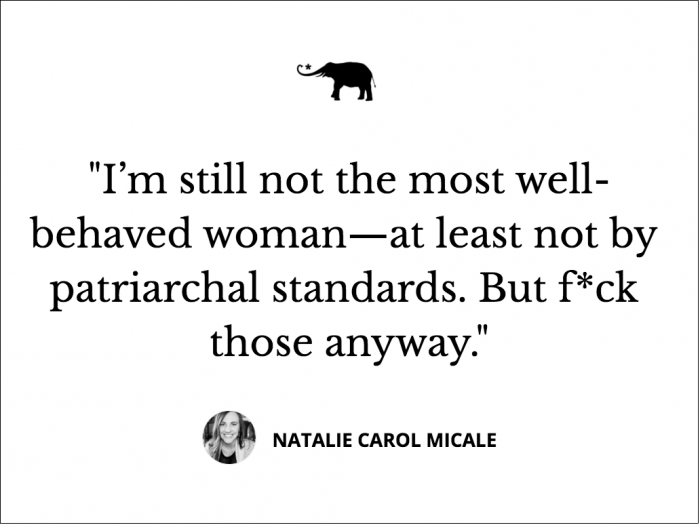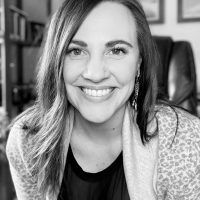I was a bad student—disorganized, inattentive, and way too chatty.
It started back in the 80s before people realized that children, like me—the restless talkers who forgot to do their homework and couldn’t concentrate with the teacher long enough to follow along—have brains that work a little differently than what is considered “normal.”
I was diagnosed with ADHD in college after years of struggling, including barely passing most of my classes (and outright failing many), forgetting to do entire projects, making presentations up as I went, and being late to classes so many times in high school that I almost didn’t graduate.
I wasn’t the attentive, well-behaved girl society expected me to be, and that was tough at times.
This is my story.
While I loved the social aspects that came with school, I absolutely hated classes. They brought feelings of being dumb, overwhelmed, and unprepared. There were countless times when I would go to bed at night and pray to wake up smart, good at math, and not get caught daydreaming while staring into space. I wanted to know the answer whenever the teacher called me and remember to do my homework. I was convinced the other children were smart and I was stupid because I got bad grades.
Things seemed to come so easily for most of my friends. But for me? I would be in the same class, hearing the same lesson, and be utterly lost.
My parents spent years and unknown amounts of money sending me to both private tutors and then to a tutoring chain. Neither had the intended impact. It was clear to everyone that I was smart, but not to me.
I was an avid bookworm, scored off the charts on reading comprehension and writing, and had no trouble learning my dance routines and performing them on stage at competitions. But none of that helped my grades or my self-confidence. To me, it felt like nothing could ever help. Nothing helped because I was different in a way that isn’t different at all. It simply didn’t align with conventional ideals.
And then, everything changed. At the beginning of my senior year in college, I went to see a doctor because I was having horrible migraines and anxiety. I had already attributed both to the stress of senior year, knowing full well my grades were not good enough to get me into the competitive post-graduate internship required to become a registered and licensed professional in the field I had studied.
After talking for a bit, the doctor got around to asking me some questions about my ability to pay attention and follow directions. I guess it was clear to a well-informed outsider because on that day, he prescribed me some meds, and my god, did things change. Suddenly, I was able to learn! It was amazing. I felt smart. I felt brilliant. I was organized and successful. I felt seen, heard, and truly valued in society for the first time. I realize this is dramatic AF, but it is real. I felt like I emerged from a weighty fog, could see clearly, and I knew my life would never be the same.
I went on to graduate college, started a wonderful job that gave me the experience I needed to apply for that competitive internship process, then landed the most competitive of all internships at Johns Hopkins Hospital in Baltimore, Maryland. I excelled beyond anyone’s expectations at Hopkins. I developed unshakable confidence that I had never experienced before—a genuine belief in oneself that comes only after years of failing and finally succeeding.
My life was together, and I was happy and smart. I made it.
Fast forward to about a decade ago, and things are still great. I’m engaged to the man who is now my husband, my career is on fire, and I’m killing it. I am about to start a new job that requires an extensive physical exam which includes an electrocardiogram (ECG). To everyone’s surprise, I failed the ECG test. As in, super fail, eighth-grade, math class fail. I failed it so hard they immediately took me back to run more tests to determine whether I had Long QT Syndrome (LQTS), so I needed to make an appointment with a cardiologist before they could clear me out to work. A f*cking cardiologist? I was only 34 years old. Why does a 34-year-old need a cardiologist?
Well, after that day, I did. I was diagnosed with high blood pressure and Long QT Syndrome, which refers to the measurement between the Q wave and the T wave in the heart’s electrical cycle. LQTS can lead to symptoms like fainting (check), blurred vision and headaches (double-check), and strokes and sudden death. Since I have no known family history of anything like this, the doctors determined it was likely related to my meds.
Turns out, some of the negative side effects of certain ADHD medications include LQTS and high blood pressure. While it was relieving to have found this out prior to stroking out, it was terrifying to think what all this meant. I knew I would have to stop taking the meds that, in my opinion, at the time, made me who I was.
While I was on meds, I was smart, talented, witty, funny, and successful. I was convinced it was all going to unravel by stopping the meds. But I knew I had to stop taking them and instead rely on little, old, stupid, and confused me to figure out my life. I was mad and scared, but I wasn’t about to be dead at 34.
I stopped the meds and began my epic journey of self-discovery.
I felt tired and foggy, but more determined than ever to keep my life and career on track. I made a promise to myself that I would figure out exactly how to manage my brain and my life. I didn’t realize it at the time, but I had started the process of discovering not only how to live my life, but also my life’s mission.
I researched organizational techniques, learned methods to retrain my brain to notice certain things, and most importantly, developed (and implemented—there’s a big difference between the two) habits and routines that set a person up to succeed. There were basic things like running through a quick mental checklist of everything before leaving the room, writing important information down in a dedicated notebook, or putting the keys in the exact, same spot every single day. Even to this day, if the keys aren’t where they are supposed to be, it’s time to regroup. And instead of thinking about doing it, becoming overwhelmed, and then stressing about why I’m not doing it, I’d just f*cking do it.
I do it because I know how critical it is to my happiness and success. It’s so important to want to do it. I want to take care of myself so that I can take care of my life. I was able to truly understand what it meant to be happy and successful because it happened after my ADHD diagnosis. I’m proud to say I am still those things, even after my LQTS diagnosis.
My ADHD was the asshole backseat driver of my childhood, but I know it also played a pivotal role in developing me as a leader. For example, I can handle chaos and change better than most, and I can adapt quickly. It used to feel frantic and chaotic, but now with awareness around personal leadership, harnessing the energy of the situation is easier than being overwhelmed by it. I can carefully and intentionally guide a team in times of turmoil and lead them out of chaos.
My ADHD allows me to see things from a slightly different perspective than a lot of people, which comes in extremely handy when working on high-level problem-solving and strategic planning. And, almost boringly, there are times when my brain, and the brains of most people with ADHD, function pretty much exactly like everyone else’s. The symptoms come and go, which makes consistent actions and high-level personal awareness even more important.
Today, most of the people in my day-to-day life never knew the difference between the pre-medicated and medicated me. They don’t know the work I’ve had to put into honoring my mental and emotional health, both of which I value greatly.
If I could have stayed on meds, I would have. This next point is immensely important to me: if you have ADHD and are on meds and they are safely working for you, please keep taking them because that is wonderful, and you deserve the clarity that comes with them. I used to wish that was me.
But now, I know that everyone has their own journey in life, and this is mine. The real me was destined to feel the devastating and terrifying blow of the rug being pulled out from underneath me. I needed that to trust myself to do this life thing on my own because I had no other choice.
The real me is not dumb or flighty or a bad student. In fact, I am driven and really f*cking smart. I finished graduate school last year with a 3.96 GPA (that one professor is still on my sh*t list), which allowed me to completely rewrite the story of my academic career. I could not have achieved that without strong personal leadership skills and the accompanying mindset that allows me to enjoy spontaneity and growth—all while being able to handle and learn from setbacks.
The real me is a wildly creative and curious person who craves stimulation, but also fully recognizes the importance of being focused, centered, and aware. The real me is a boss—figuratively and literally. Most importantly, the real me is a woman who knows herself and sets herself up to succeed, regardless of what hurdles she may face.
I’m still not the most well-behaved woman—at least not by patriarchal standards. But f*ck those anyway.
The real me is joyful, passionate, persistent, and empowered. The real me knows that with hard work and dedication to personal development, I can continue to rewrite the story of who I am.


 Share on bsky
Share on bsky





Read 10 comments and reply